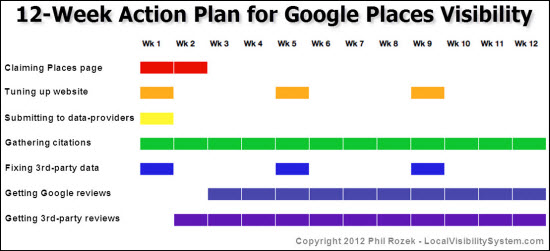I’ve been asked many great questions about customer reviews.
And rightly so. Reviews are a major factor in your local rankings in Google+Local and elsewhere, and they’re one of the very biggest factors in getting customers to choose you over the competition.
This is true both of reviews that customers write on your Google+Local page and of reviews written on third-party sites (Yelp, CitySearch, etc.).
The trouble is, aside from some fantastic in-depth posts others have done on the topic, there’s not a ton of clear info for the business owner who just wants to know the main do’s and don’ts.
So, it’s about time I put some of my answers on paper.
Here are the questions I’ve been asked most frequently – and my answers – in no particular order:
Q: I know Google often filters out reviews that seem to come in at an “unnatural” rate. How frequently should I ask customers for reviews?
A: Nobody knows for sure what rate Google considers natural vs. unnatural. It’s one factor of many that Google looks at. Plus, it varies by industry (a coffee shop has many more customers and therefore potential reviewers than a general contractor does).
The rough rule of thumb I use for my clients is: ask 1-5 customers per week. Whatever you do, be consistent from week to week.
Q: If I get “fan mail” or other positive feedback from customers, can I post it as a review of my own business?
A: No. That’s against the rules of Google and every other site I can think of that deals with reviews. The review filters will catch you probably 95 times out of 100 – certainly on Google and probably on other sites. More importantly, it’s a bit dishonest. However, you can post pretty much any kind of customer feedback on your site (provided it’s FTC-compliant).
Q: If a customer posts a great review of me on Google or somewhere else, can I showcase that review on my site?
A: Not if it’s a Google+Local review: Google will filter reviews that appear elsewhere on the web. Most third-party sites don’t seem to have policies against this (plus, so many of them feed reviews to each other). However, it’s not a bad idea to save your Google reviews (either via copy+paste or screenshot) so that in case Google ever “loses” your reviews and they don’t seem to be coming back, you can add those reviews to your site.
Q: Can I ask some of my really happy customers to post reviews on multiple sites?
A: This one calls for a multi-part answer:
If a customer reviews you on Google+Local and you want that person to post that same review on other sites, then no. Google will filter the review if it appears anywhere else on the web.
If a customer writes you a Google+Local review and then writes completely different reviews on other sites, then yes. It’s fine with Google if the same person reviews you on several sites – as long as the review posted on your Google+Local page is unique.
For third-party, non-Google review sites, yes. With the possible of exception of Yelp, these sites generally don’t feel strongly about review polygamy.
Q: How many different sites should I try to get reviews on?
A: The more, the better. Diversity of review sources has always seemed to be a strong ranking factor. But my rule of thumb is 3. That is, at any given time you should be asking each customer to go to 1 of 3 sites you’d like reviews on. I’ve found that number to be large enough that you’re not putting all your eggs in one basket, but not unmanageable – the way it would be if you were to ask different customers to go 10 different review sites.
Anyway, I’d say one of those 3 sites should be Google+Local. One or both of the others should be a major site like Yelp, CitySearch, or InsiderPages. If there’s a highly prominent industry-relevant review site – like DealerRater, AVVO, or TripAdvisor – then it’s probably worth having that be one of the 3. Of course, once you rack up at least a few reviews on one of the sites, it wouldn’t be a bad idea to change it up and ask customers to review you on a different site.
Q: How do I know which third-party sites I should ask my customers to review me on?
A: See answer to above question. Again, the short answer is that the “core” of your body of reviews should consist of Google+Local reviews and of reviews on least a couple of other major sites, like Yelp or CitySearch.
To the extent possible, you should also try to get reviews on sites that are geared toward your industry. One starting point for determining those sites is to see which sites your local competitors (particularly the top-ranked ones) have reviews on. Another is to check out the list of industry-specific sites on my Definitive Citations List.
Q: How many customers should I ask for Google reviews versus for reviews on other sites?
A: I usually suggest that my clients shoot for 50% Google+Local reviews. Reviews on other sites should make up roughly the other 50%. The idea is not to put all your eggs in one basket.
Q: Where do Bing and Yahoo reviews fit in? Do they help my visibility in Google at all?
A: They don’t help your Google rankings. Bing and Yahoo are Google’s direct competitors. They go together like peanut butter and mayonnaise. However, it’s still good to get reviews on Bing and Yahoo simply to attract the people who use those two, smaller search engines.
By the way, as of this writing, there’s no longer a way to write reviews directly on Bing. But in many cases Yelp’s reviews get fed to Bing, so your reviews on the former will help your visibility in the latter.
Q: Can I suggest certain things I’d like my customers to write in their reviews?
A: Another gray area. Google says you can’t. Other sites don’t seem to take a stance (as far as I’ve been able to tell).
From a strictly ethical standpoint, you certainly shouldn’t put words in your customers’ keyboards.
Plus, if you tell customers what specific keywords to use, your reviews will probably get filtered because they seem contrived. Even the ones that do stick will look about as natural as Donald Trump’s “hair.”
However, if your customers genuinely have no idea what to write (not likely), it’s fine to give them a rough idea of “talking points.”
Q: Should I wait until I’ve claimed my Google+Local to start asking customers for reviews?
A: Yes, generally. If you have duplicate or incorrect Google listings floating around that you’re trying to remove, I’d suggest waiting until the dust settles and you’ve only got one listing (per location). Also, building up a corpus of reviews is a long-term project, so in one sense there’s no great rush.
However, if you don’t have a bunch of inconsistent information about your business floating around the web, and (again) if you don’t have a problem with duplicate listings, you can probably ask for customers to review you and not be afraid that the reviews will go “poof.”
Q: How do I avoid looking “amateurish” when I ask for a review?
A: Depends on how you ask. As with anything else, there are cheesy ways and professional ways to go about it:
“Please oh please write me a review, pretty please with sugar on top” = cheesy
“Dear Valued Customer, your feedback would be appreciated” = cheesy
“Here’s a Starbucks card, now I expect my 5 stars, damnit” = cheesy
“If you could take a minute to write down your honest opinion about your experience with me, I’d really appreciate it” = professional
“I know other potential customers would want to hear what you think of our service – warts and all – so it would be great if you could jot down a review of us” = professional
In general, I’ve found that more you use a no-pressure, “this is a personal favor I’d appreciate” approach, the easier it is to ask people for reviews, the less awkward it is for everybody, and the more willing people are to oblige.
Q: My customers always seem to forget to write me reviews. What should I do?
A: Nag. But try to do it in a classy, relatively low-pressure way. (“Gee, Phil, you mean that’s all I have to do?”) I guess it depends on how close you are with your customers. If there’s a “relationship,” you can ask repeatedly without becoming a burr in the saddle. Some people will just never get around to it. Others you may need to ask a total of 2-3 times. You never know who falls into which category.
Q: My customers said they posted reviews of me, but why aren’t they showing up on my page?
A: They may have been filtered out if they were Google+Local or Yelp reviews. I suggest reading this post from Mike Blumenthal (if you haven’t already). Of course, this assumes that your customers know how to post reviews for you, and that you’ve provided clear instructions to customers who may not be so review-savvy.
Q: What if Google loses my reviews?
A: Keep getting as many Google reviews as possible, but also try to get reviews on other sites. I know it can be tough. I know how much hard work for a given job each review represents, and how badly Google sucks at keeping those legitimate, hard-earned reviews where they belong. Still, the basic choice is (1) do nothing and have nothing to lose but also less potential to attract customers or (2) try to rack up a few more reviews and have that extra factor working in your favor.
Q: What’s the easiest way to get reviews?
A: Depends. In a nutshell, any way in which you can both ask and provide clear instructions at the same time is a good approach. I’m kind of partial to the review handouts I make and use with my clients (duh…that’s why I created them), but I can think of about 20 other ways to get reviews.
—
Any nagging questions you have – or have heard – about reviews? Better yet, any answers to those questions? Go for it – leave a comment!
 Unless you’re Arnold, furious bursts of action alone probably won’t get you very far. You need a plan for the action.
Unless you’re Arnold, furious bursts of action alone probably won’t get you very far. You need a plan for the action.